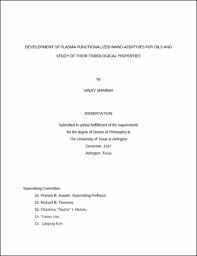
ATTENTION: The works hosted here are being migrated to a new repository that will consolidate resources, improve discoverability, and better show UTA's research impact on the global community. We will update authors as the migration progresses. Please see MavMatrix for more information.
Show simple item record
| dc.contributor.advisor | Timmons, Richard B. | |
| dc.contributor.advisor | Aswath, Pranesh B. | |
| dc.creator | Sharma, Vinay | |
| dc.date.accessioned | 2019-04-10T21:40:13Z | |
| dc.date.available | 2019-04-10T21:40:13Z | |
| dc.date.created | 2017-12 | |
| dc.date.issued | 2017-10-20 | |
| dc.date.submitted | December 2017 | |
| dc.identifier.uri | http://hdl.handle.net/10106/27955 | |
| dc.description.abstract | Lubricants used in motor engines contain various chemical species to help enhance energy efficiency and provide increased longevity. Unfortunately, at the same time, these additives become a source of catalytic poisoning, thus increasing emissions from the tailpipe. With growing concern for the negative impacts of human activities on the environment, regulatory bodies for the automobile lubrication industry have set up strict guidelines for chemical compositions of their end products, including engine oils. This research work is a step towards development of a new class of lubricant additives, which are less harmful to the environment and, simultaneously, also reduce friction and wear. A novel approach, employing nanoparticles, has been used to deliver chemical species to tribological contacts to provide improved anti-friction and anti-wear benefits. For this purpose, plasma polymerization technology was used to functionalize nanoparticle additives with chemistries known to provide good tribological outcomes. Different nanoparticles (PTFE and TiO2) and chemistries (Silicon and Boron rich) were examined and plasma treatment and process protocols were developed. The surface tailored nano-additives derived were dispersed in pure mineral oil and mineral oil containing reduced amounts of zinc dialkyl dithiophosphate (ZDDP)/Ionic Liquid additives. The resulting solutions were subjected to thorough tribological testing. To help elucidate the lubrication mechanism of these nano-additives optical, and other highly surface sensitive techniques, such as X-ray photoelectron spectroscopy (XPS), X ray absorption near edge spectroscopy (XANES), Surface probe microscopy (SPM), etc., were employed to analyze the tribofilms formed on the wear surfaces. Additionally, the lubrication efficiency of these functionalized nanoparticle/oil mixtures were compared and contrasted with tribological results obtained from unmodified nanoparticle/oil mixtures, as well as with the existing industrial grade additives such as ZDDP. The overall results indicate that plasma functionalized nanoparticles have very promising antifriction and antiwear properties and they exhibit synergistic interaction with traditional additives to give enhanced tribological benefits. This new approach with plasma functionalized nanoparticles is very effective in reducing the harmful levels of phosphorus in the oils and, at the same time, deliver outstanding friction and wear performance. | |
| dc.format.mimetype | application/pdf | |
| dc.language.iso | en_US | |
| dc.subject | Tribology | |
| dc.subject | Nanoparticles | |
| dc.title | DEVELOPMENT OF PLASMA FUNCTIONALIZED NANO-ADDITIVES FOR OILS AND STUDY OF THEIR TRIBOLOGICAL PROPERTIES | |
| dc.type | Thesis | |
| dc.degree.department | Materials Science and Engineering | |
| dc.degree.name | Doctor of Philosophy in Materials Science and Engineering | |
| dc.date.updated | 2019-04-10T21:42:24Z | |
| thesis.degree.department | Materials Science and Engineering | |
| thesis.degree.grantor | The University of Texas at Arlington | |
| thesis.degree.level | Doctoral | |
| thesis.degree.name | Doctor of Philosophy in Materials Science and Engineering | |
| dc.type.material | text | |
| dc.creator.orcid | 0000-0002-8010-5560 | |
Files in this item
- Name:
- SHARMA-DISSERTATION-2017.pdf
- Size:
- 5.200Mb
- Format:
- PDF
This item appears in the following Collection(s)
Show simple item record


